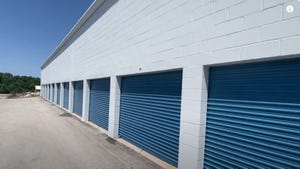November 1, 1997
Your Facility Report Card
Dean's List or Academic Probation?
By Cecile Blaine
If your facility was a student, what grade would it get on itsend-of-the-year report card? Would it be an A+ or a C-? You bethe judge. The end of the year serves as an excellent time foryou, as a facility operator, to take a look at your business andassess how well it is doing in terms of maintenance andmanagement issues.
Now is the time when the maintenance schedule you put togetherat the beginning of the year should be put to the test. Have thedaily, weekly and monthly chores been done regularly and onschedule? If not, you'll want to make note of them and set somegoals for next year. What are the priorities? What is beingneglected? What projects need to be budgeted for? Answers tothese and other questions will help you create not only amaintenance schedule for next year, but a budget, as well.
Typically, the manager is the person who is in charge ofimplementing the maintenance check list and the budget that fuelsit. If that is not the case, however, it's time to stay afterclass, says Jim Chiswell, owner of Chiswell and Associates Ltd.,a consulting firm out of Amherst, N.Y. "Don't let anotheryear go by without (the manager) getting involved in theprocess," he stresses. "The manager is the front line.He is the greatest tool that any owner has--whether the facilityis going to be successful or not.
"When filling out your facility's report card, look firstat the key maintenance issues that directly affect your customer.Chiswell recommends keeping the customer in the forefront of yourminds. "I want to make sure that my customers arehappy," he says.
Where's the Water Fountain?
Leaky roofs and flooded units, for example, can spell disasterat any facility. "The whole issue of water for this industrycan be a killer," Chiswell points out. As a result,maintaining the quality of a facility's roofs and gutters isessential.
Sigel Roush agrees. As vice president of Capacity Development,a facility management firm in Highland Park, Ill., Roush says youshould start tallying your facility's report card from the top."You should make sure that the integrity of the roof is intact, especially the flat roofs," he says.
Roush's staff walks the roofs of his facilities once a monthto clear them of garbage, because those items can eventually rustand create leaks and other internal problems. Some of the worstcases involve people throwing automobile batteries on roofs, withthe battery acid burning holes in the roofs or even causingexplosions, according to Roush. Because the roof is such animportant and vulnerable area, it's a good idea to add it to theannual report card.
You can't have well-maintained roofs with stopped-up gutters.Sooner or later, gutters that aren't draining properly will backup and force water, snow or ice onto the roofs. Then, leakingcan't be far off. By the same token, you need to keep nearbytrees trimmed and keep leaves from building up in the gutters.So, that's another section of the report card that needsattention.
Lots of today's facilities are designed with storm waterretention systems, creating yet another channel in which watercan back up and flood a facility. As a result, operators need tomaintain the drain and make sure it is free from garbage, leavesor anything else that could stop it up.
"You want to make sure your storm water receivers areclean--not just the top of the grate. Pop the grate right off andget down and really look. If you've got to get down in there witha shovel, you've got to do it," says Chiswell.
Open Sesame
Another maintenance issue that can directly affect customersis the security gate. If the gate hasn't received properattention throughout the year, such as a monthly oiling, it couldbreak down unexpectedly--leaving customers locked out and angry."When was the last time you spent a few dollars to havesomeone come in and make sure that the chains are properly oiled,that the motor is tuned up, or that the linkage is tight?"Chiswell asks. "Again, from the perspective of a northeastoperator, you are going to have more harsh conditions," headds, which make it advantageous to maintain it now.
Likewise, swing doors can rust if the hinges are not oiledregularly, preferably on a monthly basis. According to Roush,when a customer who hasn't visited his unit for a year tries toopen the un-oiled door, he sometimes bends the hinges instead."Then, you have to replace it," he says. "That isjust way too much fun for one adult in the winter."
Snow Days
Winter's here, and part of your facility's report card shouldinclude a section on winterizing your business. Is your facilityready for the first snow? Do you have a company that will providesnowplow services? Do you have a current contract with thecompany, and how do you know they will come when you need them?
"I don't care what business you are in--you want to makesure that the person who is charged with the responsibility ofplowing that lot is reputable, has insurance, and that means heprobably isn't the lowest priced guy in town," Chiswellpoints out.
Problems with pavement and driveways need attention beforewinter hits, because chances are they will only get bigger.Cracks or potholes need to be patched before the freeze-and-thawcycle makes a Grand Canyon out of your driveway.
School Daze
Winter means shorter days and longer nights. How does yourfacility look at night? This may be more important than you'dlike to think because, as Chiswell points out, "There are asmany potential prospects driving by your facility at night whenno one's there as there are during the day. And a properly litfacility can look very attractive and much safer."
Changing light bulbs in the late fall can prevent having toexpose yourself to the elements in the coldest winter months. Infact, some facilities track when they change bulbs and do a massbulb change in the fall. "We try to make sure that we changethose in October or November...so that you don't have to go outin the dead of winter and change a halogen bulb," recallsRoush.
From Loafers to High Heels
The end-of-the-year report card requires that you look at yourfacility from a different perspective for once. Try to lookthrough new eyes, recommends Chiswell. Ask yourself if yourfacility is as comfortable for women as it is for men. "Youhave to look at your self-storage facility like you have a pairof high heels on," he says, pointing out the importance offemale customers in the scope of business.
Appealing to women through the decor of the office is anotherelement of the business that is worth looking into. Chiswellsuggests adopting a decor that is female-friendly.
"I'm not saying paint the office pink and have bowseverywhere, but not early Tool Time, either," hesays.
Maintenance Allowance
By the time you've given your facility it's grade for theyear, you have collected enough information to create next year'smaintenance budget. Some lenders require a set-aside maintenancebudget of 4 or 5 cents per square foot, per year. Whether youarrive at it through guesswork or an equation, the researchyou've just done is invaluable. And the older the facility, themore need there will be for a maintenance budget. In fact,Chiswell recalls, "I've seen facilities that are 5 years oldthat have just been totally ignored and a facility that is 10 or15 years old that looks 10 times as sharp," due to thedegree of maintenance that has been followed by the manager andoperator.
R.M.A. (Remember Me Always)
Probably the most valuable information you gather through afacility report card is about your customers. Who were they? Howold are they? Where do they live? Whether you have a computer ornot, you now have a full year's worth of customer information atyour fingertips, and it would be a crime not to use it.
"Let's say that the average commercial customer isrenting a 10-by-10 or larger space, and we determine that bylooking at the trends, that our commercial customer stays anaverage of 20 months and that our average residential customerstays an average of three months," says Chiswell. "Whowould I rather have?
"(Commercial customers) pay better, they stay longer. Butin many cases, we are doing nothing to try to attract them."
Likewise, it's also an excellent time to ask yourself if youare getting the kind of return on auctions that you are lookingfor. If your recovery rate is very low, then you might want todirect more attention toward negotiating with customers andavoiding auctions altogether. "Let's say you auction 50units, and on those units, you averaged 90 percentrecovery," says Chiswell. You could consider your auctionsvery successful. If, however, you only recover 10 or 15 percentof what's owed to you through the auctions, then it is probablybetter to make a deal with your customers to get them to pay whatthey can, so you can repossess the unit.
Final Exams
Getting an "A" on your facility report card at theend of the year is certainly something to write home about.Whether you get to go to the head of your class or you have tostay back a year, sometimes the journey is just as important asthe destination. In other words, no matter what grade youreceived on your facility report card, use what you've learnedabout your facility in the next year as far as knowing where thesticky maintenance issues are, budgeting, marketing and handlingdelinquent accounts. In all these areas, it is easy to see that alittle maintenance each month goes a long way toward keeping theannual chores down.
"By staying on top of the faciliy, by correcting thelittle things, it prevents them from creating major problemslater," concludes Chiswell.
You May Also Like





